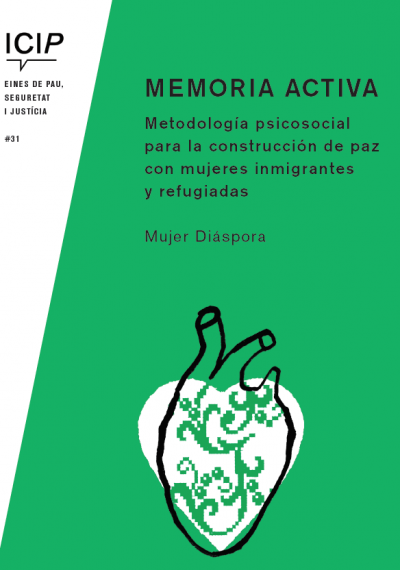
Memoria Activa. Metodología psicosocial para la construcción de paz con mujeres inmigrantes y refugiadas. Barcelona: International Catalan Institute for Peace, 2025.
Active Memory is a psychosocial methodology with a feminist approach that seeks to heal and empower immigrant and refugee women, especially those who come from countries at war or that are experiencing armed conflict or chronic violence. This process aims to bring to light experiences of violence, displacement and exclusion. It transforms individual and collective memory into a tool for healing and empowerment, giving a voice to historically silenced women and empowering them beyond the role of victim. In addition to reconstructing personal narratives, it reinforces community identity and promotes their role as peacebuilders.
The power of Active Memory lies in its ability to integrate sensory and aesthetic elements as a means to address the physical, mental, cognitive, and spiritual aspects that emerge when working on the reconstruction of memory, whether individual, historical, or as part of transitional justice processes. This aims to be a methodology for resisting power structures that seek to perpetuate oblivion.
The book Memoria Activa (available in Spanish) was written by the organisation Mujer Diáspora. It presents the five core concepts that guide the methodology (sensorial, healing, diversity, spirituality, and symbolic return), as well as the techniques to develop these processes, including cooking. Active Memory sees cooking as a space and a significant political act for women. By challenging and subverting the roles traditionally associated with submission and domesticity, women reclaim cooking as a public space of expression and encounter, challenging conventional notions of gender and reaffirming their presence in public spaces.
The gastronomical experience is viewed as a vital space where strong relationships are formed and solidarity is fostered. Through the preparation and exchange of food, women contribute to the construction of communities based on collaboration and mutual support, creating a social fabric with significant political implications. Commonly perceived as a means of preserving and transmitting culture, cooking becomes a means of sharing unexplained stories, making them valuable and allowing them to become part of the official historical record. This space is perceived as ideal for reconstructing historical memory, encapsulating meaning in each culinary gesture.
The book also analyses the processes of active listening, healing, sharing testimonies and artistic creations as techniques of Active Memory.
About Mujer Diáspora
Mujer Diáspora is a feminist and psychosocial organisation that works with immigrant, refugee and diaspora women, and positions them as peacebuilders. It began as an organisation committed to dignifying the experiences of these women, who have often faced violence, alienation, discrimination and human rights violations.
Their work encompasses mental health, historical memory, transitional justice, and peacebuilding, integrating training as a tool to create support networks and promote the transfer of knowledge between women of different generations and contexts.
